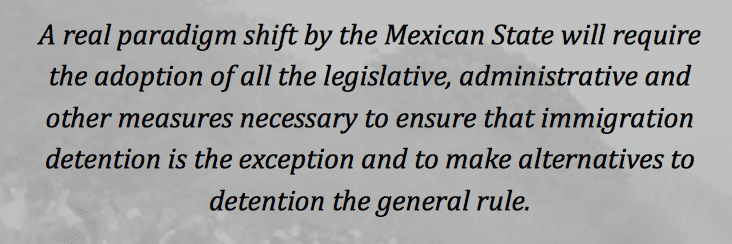
On August 18, 2014, the Inter-American Commission on Human Rights (IACHR) presented their report Human Rights of Migrants and other Persons in the Context of Human Mobility in Mexico, which highlights immigration detention as a primary contributor to human rights violations in the country. As stated by Commissioner Felipe González, Rapporteur on the Rights of Migrants, “in Mexico, immigration detention remains the rule and not the exception, both in policy and in practice.” According to the report, “automatic immigration detention is one of the Commission’s greatest concerns.”
In the face of growing numbers of migrants detained by Mexican authorities in recent years—86,929 in 2013 and 43,863 just from January to May of 2014—the Commission expressed particular concern regarding the detention of refugees, asylum seekers, victims of crime, children, adolescents and other groups in especially vulnerable situations. As the report shows, the use of immigration detention often provokes a series of rights violations, including the use of detention centers that are unreasonably similar to incarceration facilities, and a worrisome lack of access to health services, psychological attention, legal assistance, and communication with family members. The severity of this situation is compounded by civil society organizations’ limited access to detention centers for purposes of monitoring detention conditions and providing legal assistance.
The IACHR also observed that on numerous occasions, migrants were detained indefinitely, especially when they tried to exercise their right to legal defense mechanisms. The Commission quotes testimonies of migrants who had spent more than 60 days and up to 10 months in detention due to the fact that they had taken legal recourse to raise issues regarding their immigration status, including persons who feared being returned to their countries and were seeking international protection.
The report affirms that immigration detention is used despite recognition by the State that current immigration law in principle provides for alternatives to detention in certain instances. These alternatives are rarely applied in practice, and the Commission asserts that they must be strengthened and applied as the rule and not as the exception, using a risk-assessment tool that is based on a presumption of freedom. Notably, the Mexican State has expressed interest in expanding its knowledge regarding the implementation of non-custodial models for unaccompanied migrant children and adolescents, representing an important first step toward the protection and respect of migrants’ rights.
The International Detention Coalition (IDC) and its members congratulate the IACHR for this important work in the interpretation and establishment of regional standards regarding immigration detention and alternatives to detention, which will extend beyond the recommendations to one particular State or region. We also express our willingness to continue our collaboration with the Commission, the Mexican State, and civil society organizations in the development and implementation of alternatives to detention that allow migrants and their families in Mexico to live freely in the community while they await the resolution of their immigration case.